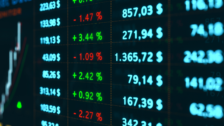Finding the next Amazon
Every fund manager talks about finding the next Amazon, Facebook, or Google, but very few are able to do it consistently. In fact, a broad majority of global equity strategies seem to live by the saying “if you can’t beat them, join them,” with the big tech names dominating value, growth, and every strategy in between.
As investors, we are told regularly that active (versus passive) index strategies, are better suited to more volatile conditions, in which case 2020 should have been an excellent hunting ground for active. So far, the results are mixed, with dispersion in equity returns ranging from negative to +30%. One strategy, however, has stood out amid the volatility, delivering both protection on the downside and capturing significantly more of the upside.
This strategy is the Franklin Global Growth Fund, run by the New York-based John Remmert and Don Huber. The story has an Australian touch, however, with portfolio manager Francyne Mu a University of Melbourne alumnus. 2020 has been a watershed year for the growth-focused team of 11 research analysts, with the strategy returning 28.7% in the 12 months to September on the way to being awarded Fund Manager of the Year, by research house Morningstar. In fact, the strategy has been ranked in the top 50% of all global equity strategies 98% of the time since its inception.
The strategy is ably lead by Don Huber, who has an interesting backstory of his own, joining Franklin Templeton in 2002 after working in a series of permutations of JP Morgan, Chase Manhattan, and their other guises. The family-oriented nature of Franklin Templeton, which is currently led by Jenny Johnson, the grand-daughter of the founder, is seemingly reflected in Franklin’s high-performing portfolio. Nurturing seems to be a trait of the fund, with management seeking to find fast-growing medium- and larger-sized businesses that are not fully appreciated by the rest of the market.
While most investors naturally focus on headline returns, the team recently released a series of charts outlining the market capitalisation that its core holdings have added over time. This is a far more insightful measure and assists in removing the benefit that ‘momentum’ and other factors can have on short-term performance. As we know, compounding returns, whether by businesses themselves or the people that invest in them, is the most powerful investment strategy.
The results are actually quite extraordinary. The fund’s oldest holding, Danaher Corp (NYSE: DHR), which produces a diverse range of medical and other industrial equipment, has grown its market cap from A$30 billion in 2008 to more than A$200 billion today. Similarly, the “next Amazon,” the Argentina-based Mercado Libre (NASDAQ: MELI), has grown from a capitalisation of A$3.4 billion in 2010 to A$78 billion in 2020. This sort of compounding performance is rare in the realm of global equities, with many regularly turning over portfolios on concerns of valuation or benchmark performance, rather than continuing to back consistent winners.
Despite not being explicitly excluded, the portfolio has avoided the likes of the FANGS or FANMGS, noting that “as money pours into certain global equity ETFs or passive strategies, index constituents benefit proportionally based on market weighting in the index, further pushing up prices of mega-cap stocks.” It is this exclusion of the well-known tech names that has made 2020’s performance that much more exceptional.
As the name suggests, the holdings of the fund are by no means cheap, with an average P/E of around 40 times earnings. However, as highlighted in another article ‘Are P/E ratios a misleading indicator? P/E ratios can be misleading in only reflecting the past and not appreciating either the underlying sales and profit growth of companies, or valuing the huge investments that growing businesses make in themselves.
One of the defining features of the fund has been the near-obsession with understanding the “economic exposures” of the companies they own. Economic exposures refer to the real end-customer, and therefore determinant of success for any portfolio company. Treasury Wine (ASX: TWE) is a perfect example, noting the fund doesn’t invest in Australia, with this week’s tariff announcements highlighting the fact that the company had very much become a Chinese wine exporter rather than a global one. There is a plethora of examples across the portfolio where companies are allocating to certain “sectors” of the market but whose earnings are generated in a completely different area. By understanding the ultimate end-market of every company, true diversification is achievable, as opposed to the less-diversified nature of major stock market indices.
Given the performance, there are many success stories, including Mercado Libre, which we covered here. Shopify Inc. (NYSE: SHOP) is another, with the stock up 170% in 2020 alone. The Canadian-based company couldn’t have been any better positioned for the digital sales onslaught that came in the wake of COVID-19, offering an all-in-one e-commerce platform into which small businesses can basically “plug and play.” While the lockdowns have been a benefit, the move to online shopping was only gaining traction before it occurred.
The fund also captures the autonomous vehicle theme, via an investment in Aptiv PLC (NYSE: APTV) the Dublin-based safety technology and connected vehicle specialist. According to management “Aptiv is well-positioned to outpace market growth through increasing penetration of key technologies to deliver end-to-end smart mobility solutions.”
It is rare in this environment to find a managers that combines both thematic and fundamental investing, and is able to deliver on both.










